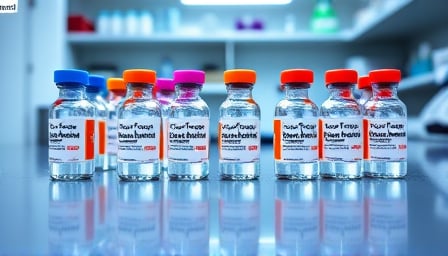Moderna Inc. Faces a Sharp Sell‑Off Amid Trump‑Era Vaccine Controversy
Moderna’s shares dropped 6.56 percent to 20.2539 € on Friday, the steepest decline seen in the company’s recent trading history. The fall is a direct reaction to a Washington Post report that the Trump administration is preparing a presentation to the Centers for Disease Control and Prevention (CDC) that would associate the COVID‑19 vaccine with the deaths of approximately 25 children. The report, which was widely disseminated by Bloomberg, Reuters, and several German financial portals, has ignited a torrent of negative sentiment across the vaccine‑maker sector.
The Catalyst: A Politically Charged Narrative
The Trump officials’ intent to link pediatric fatalities to the vaccine is unsubstantiated and lacks any scientific validation. Moderna, however, is a highly visible public‑health asset and therefore a convenient target for politically motivated attacks. The timing of the report—coinciding with a period when the S&P 500 was already struggling to maintain its recent record highs—amplified the impact. Investor panic was not limited to Moderna; Pfizer’s stock also fell, as reported by German media outlets, underscoring a broader industry-wide vulnerability to political narratives.
Market Dynamics and Investor Sentiment
At the close of the Nasdaq, Moderna’s market price of 25.39 USD represented a significant deviation from its 52‑week low of 23.15 USD and a dramatic distance from its 52‑week high of 75.371 USD. The company’s market capitalization—nearly 9.77 billion USD—has been under pressure as the negative press erodes investor confidence. The price‑to‑earnings ratio, currently ‑3.436, signals that the stock is trading at a valuation that investors consider unsustainable, especially given the company’s recent revenue streams from mRNA therapeutics.
The Long‑Term Investment Case
Historical data illustrate that a $1,000 investment in Moderna five years ago would have yielded a loss of ~60 % (from a closing price of 59.34 USD on 11 Sep 2020 to the present). This stark reality underscores the risk that investors face when short‑term political drama eclipses fundamental business performance. While Moderna continues to develop mRNA medicines for infectious diseases, immuno‑oncology, and cardiovascular conditions, the immediate market reaction shows that sentiment can pivot quickly in the absence of robust, data‑driven narratives.
Conclusion: A Wake‑Up Call for Investors
The precipitous decline of Moderna’s stock is a stark reminder that the biotech sector remains highly susceptible to political and media influence. The company’s scientific prowess and product pipeline do not immunize it against sentiment‑driven market swings. Investors who rely on the long‑term potential of mRNA therapeutics must recognize that short‑term volatility—fuelled by unverified claims—can erode capital and dampen returns. In an era where public trust can be mobilized as quickly as a tweet, the financial viability of biotech giants like Moderna hangs in a delicate balance between scientific innovation and the political narratives that surround them.
